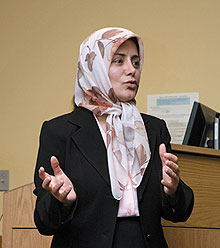  |
| HOME | THIS ISSUE | CALENDAR | GRANTS | BACK ISSUES | < BACK | NEXT > |
Middle East studies award given to women’s rights activist by Cindy Weiss- April 21, 2008 |
||||
| Fatemeh Haghighatjoo was in the fifth grade in Iran when the 1979 revolution establishing an Islamic republic took place.
She was in secondary school there when war broke out between Iran and Iraq. Now she is monitoring events in her home country from afar, as an assistant professor-in-residence in women’s studies at UConn. Haghighatjoo, a women’s rights activist and former member of the Iran’s reform parliament, was awarded the first Middle East Studies Achievement Award last week by Ross MacKinnon, dean of the College of Liberal Arts and Sciences, which is home to an interdisciplinary Middle East Studies group of scholars. The award recognizes Haghighatjoo’s service, scholarship, and commitment to Middle East Studies and her lifetime achievements in the promotion of knowledge and awareness about the Middle East. Haghighatjoo was one of 13 women elected in 2000 to parliament in Iran, which was dominated by reformists. She resigned in 2004 when anti-reform measures began, and after the judiciary sentenced her to 20 months in prison. The sentence was later reduced to 10 months, which she has not served. Last year Haghighatjoo was a visiting scholar at the Massachusetts Institute of Technology and Harvard University. This year she has taught two classes in CLAS at UConn. In a lecture preceding her award, Haghighatjoo drew close connections between the women’s and students’ movements for greater freedom in Iran. Advocates for women’s rights are trying to change laws that give husbands authority over where their wives can travel; that prohibit joint custody of children; and that allow women to be married at 13, among other things. Women who demonstrate for greater freedom are arrested, handcuffed, beaten with batons, and kept in prison, she said. In one of the latest crackdowns, in March 2007, women who gathered to protest the arrest of other women a year earlier were placed in solitary confinement in jail for two weeks, or released on onerous bail charges, she said. Still, she remains optimistic that those seeking greater human rights in Iran will prevail. Some people have been arrested twice and continue to advocate, she said. “I see they are standing on their rights,” she said. “So I am optimistic – why not?” |
| ADVANCE HOME |

